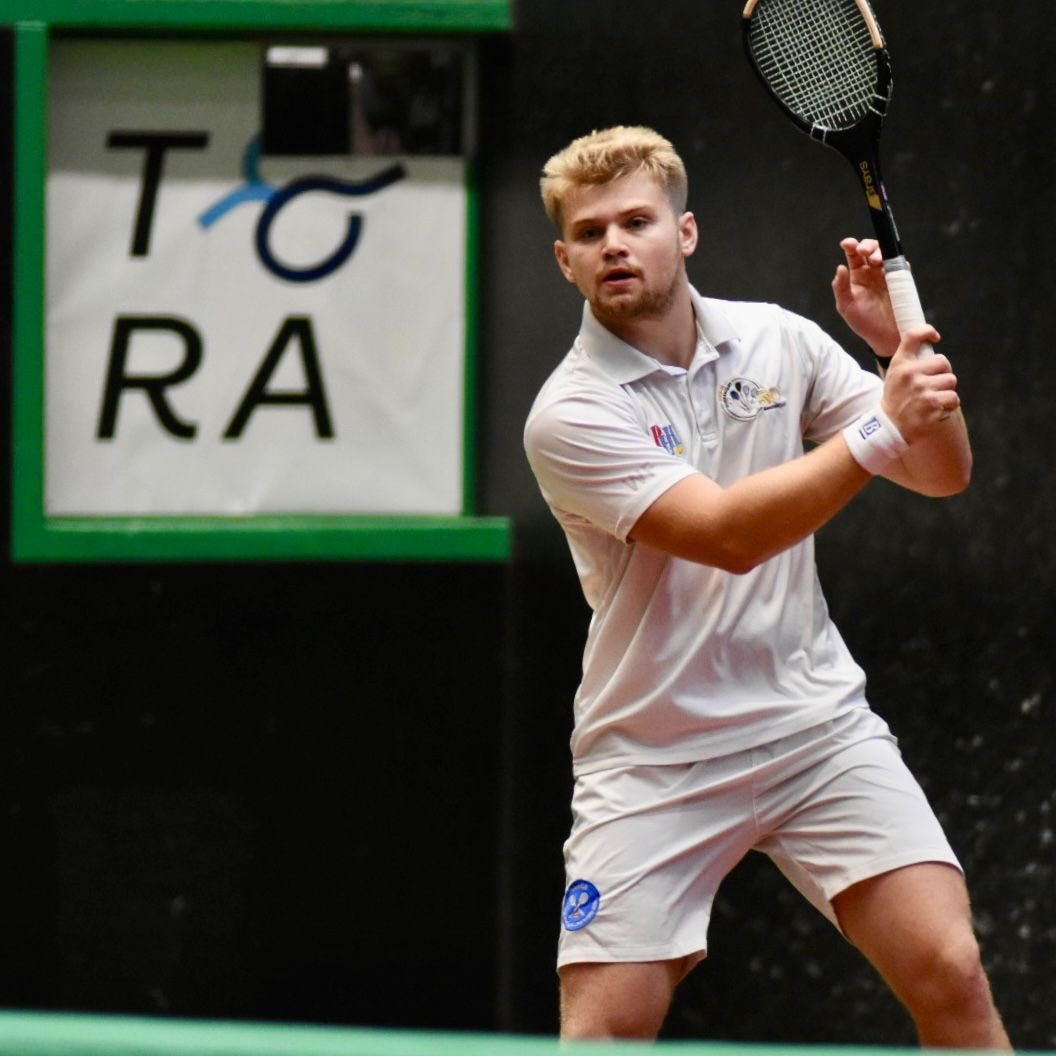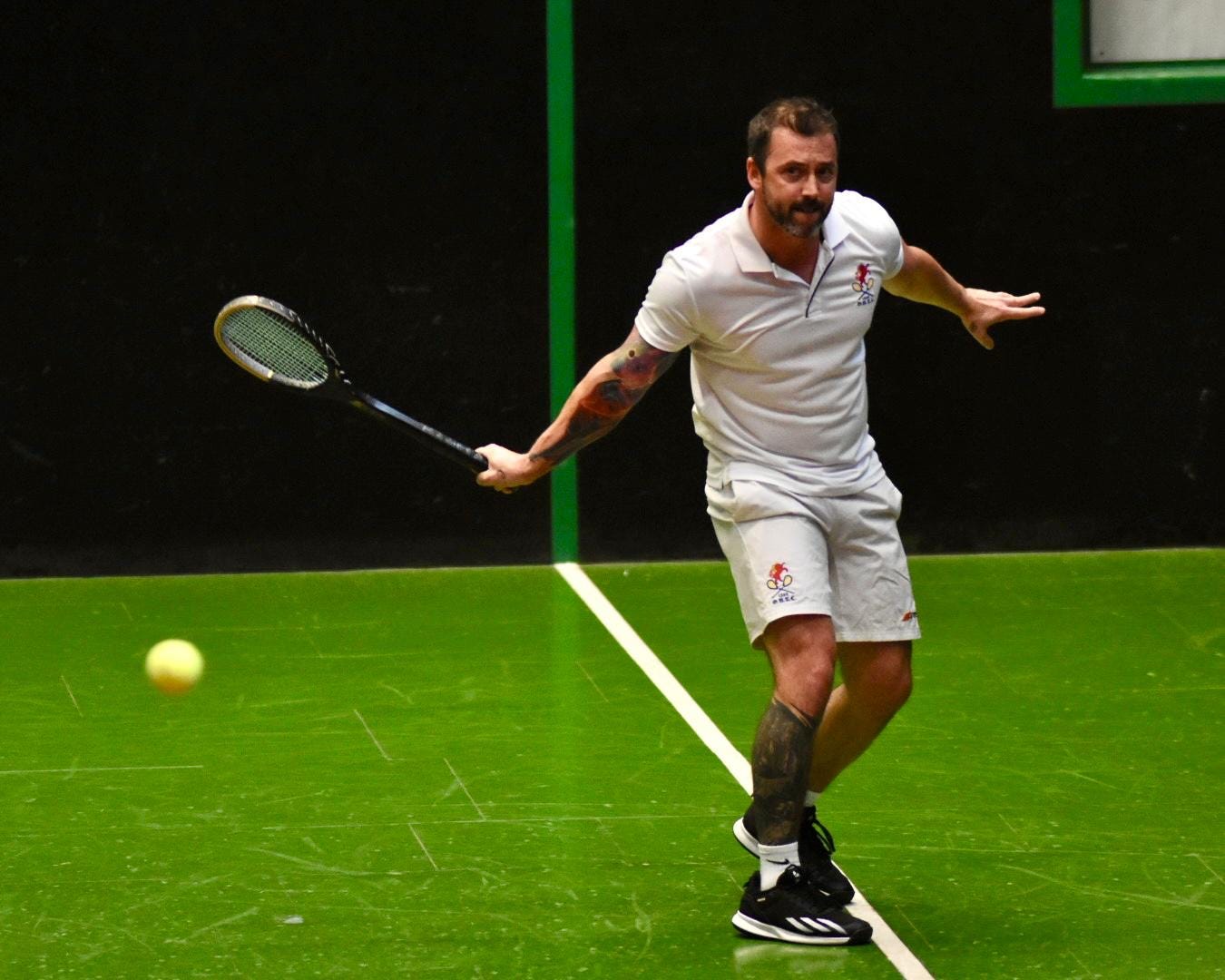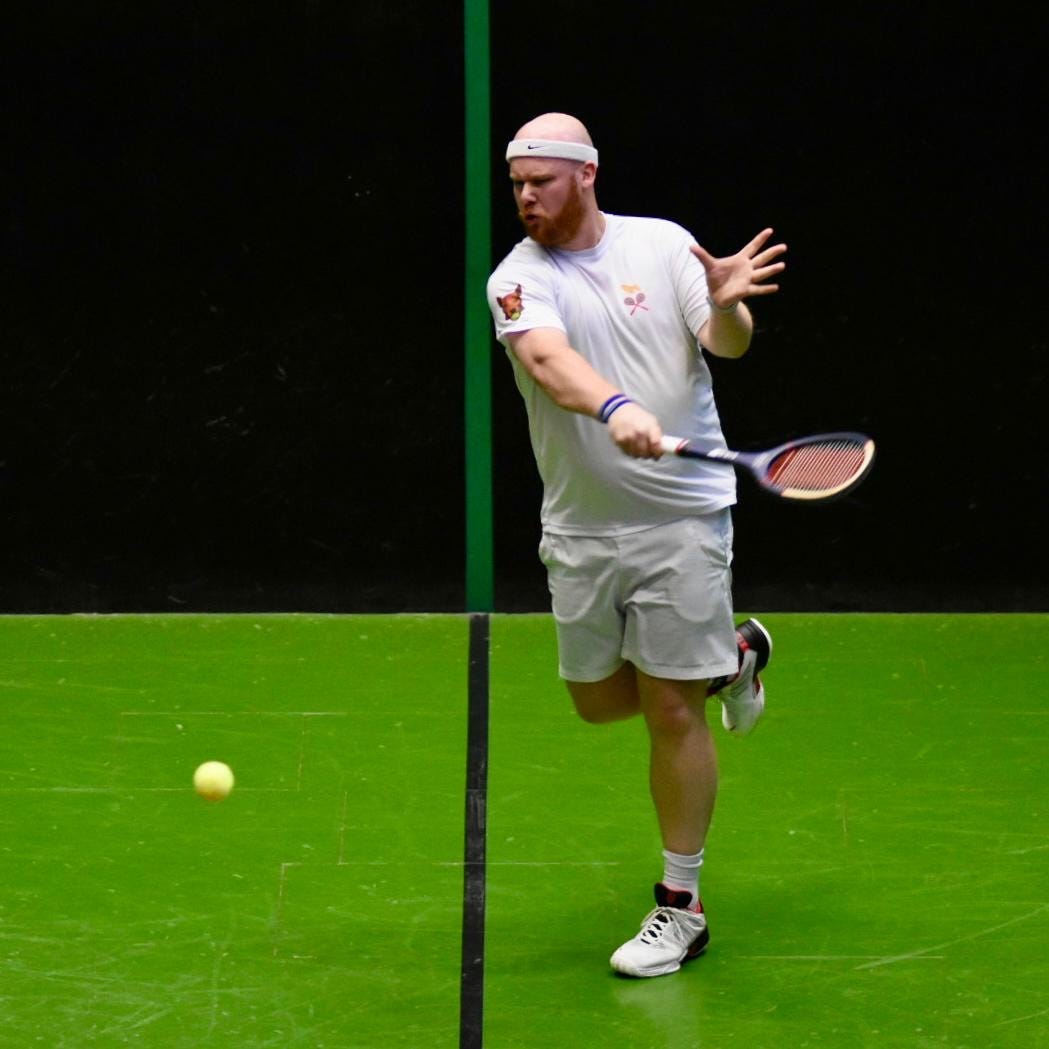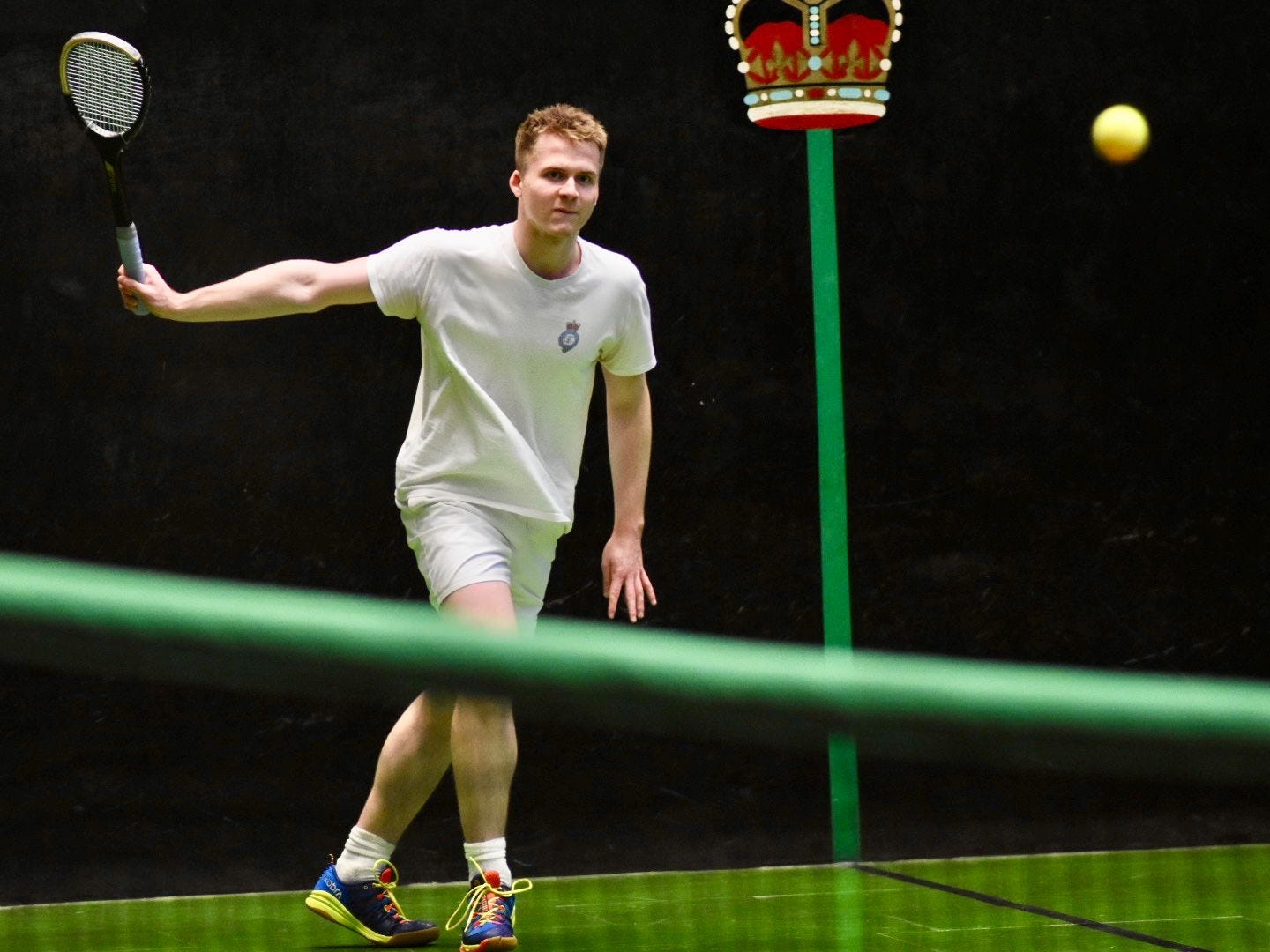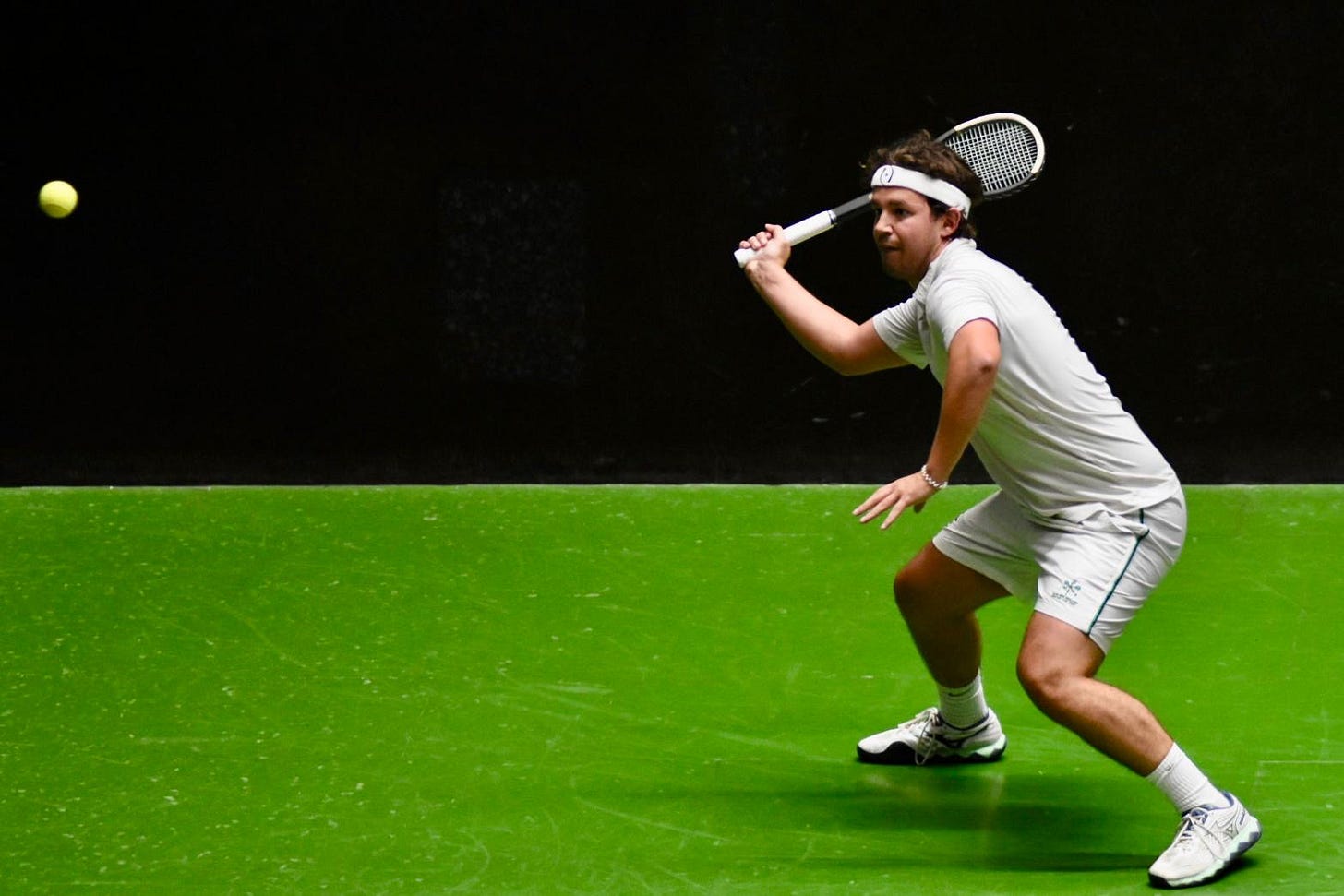British Open qualifying kicks off with new faces providing challenge to experienced hands
Top eight qualifying seeds progress to the second round of competition, with five debutants each falling short
The British Open qualifying finally got underway at the Queen’s Club on Wednesday, with a packed schedule of eight matches and a line-up of both new and familiar faces gracing the hallowed playing hall in West London.
The first ball of the two weeks of competition was struck by Benedict Yorston in an all-Radley battle against Alex Machin, the latter making his debut in major competitions. The Radley assistant professional was clearly showing the nerves of the occasion, getting caught out several times on the half-volley and making several unforced errors through the first few games. Once behind on the scoreboard, Machin lashed out with a couple of rouge forces that slammed into the net. At the other end of the court, Yorston was a model of consistency, with few errors and conceding few chases. His serving variety put Machin on the back foot, exploiting the deficiencies in Machin’s left-handed return-of-serve. Machin won his first game at the start of the second set as he continued to try and step inside and force the return of serve, and despite producing a few good winners was not good enough to breakthrough Yorston’s solid defensive skills. The recent MCC All-Comer Champion won through to the second qualifying round in little over half an hour.
The second match was a rematch from the same round in the previous year, with Leamington’s Chris Aley hoping to improve on his result against the Oratory’s Henry Henman. Since that last encounter — which Henman won in three sets — Henman had turned pro and Aley had spent a stint working in Australia. Henman was determined not to let Aley take a set from him again, launching a blistering attack from the start as he leaned into his volley return, sending the ball back down the court at extreme pace. But Aley resisted, keeping within touching distance of Henman throughout the first set, especially from the service end as Henman’s forcing accuracy wavered. However, Aley’s return of serve was his Achilles’ heel, allowing his younger opponent to pin him down with some well executed underarm twists.
Henman maintained his narrow lead throughout the first set. Aley’s best chance came at deuce at 3/4 but Henman saw off the threat by laying two 1- and 2-chases. Through the second set, Henman relaxed into a more traditional game, opting to test Aley into the corners rather than on his volley. It paid dividends, as Henman was able to outrally Aley and let the errors eventuate at the other end of the court rather than his own. He neatly wrapped up the second set by winning six straight games, securing his spot in the second round against Yorston.
Next was another rematch from qualifying in years past — this time as far back as 2022 — as Will Flynn took on Mark Hobbs. Both were in different places from then, as three years ago Hobbs was on his return to competitive play while Flynn was just emerging from the junior ranks. Now, both had much more competitive match experience under their belts, and looked stronger on court, both physically and mentally.
Flynn had the better start, going up 3/0 as Hobbs played himself into the match. The play then tightened considerably, with Flynn trying to play with heavy cut and power and Hobbs aiming flat over the low part of the net. Hobbs’s railroad encouraged Flynn to force, with mixed results, as the pair exchanged games from then on out in the set, game aftr game running to deuce. Flynn’s early advantage proved key as he edged slowly towards a one set lead.
The pattern continued into the second set, with the first game alone featuring eight deuces before Flynn finally found a ball into the winning gallery. That kicked Flynn into a good run, as his footwork, timing, retrieval and shot-making all started to click. Hobbs was becoming increasingly despondent as even Flynn’s flukes were paying off. Hobbs tried forcing his way out of the hole he found himself in but Flynn was equal to the task. He bagelled the set, moving on to the next round comfortably.
The fourth match of the day saw Zack Smart — brother to Leon Smart — make his British Open qualifying debut against Craig Greenhalgh. The match was a tough battle between two floor games, with neither player looking for big shots or extravagant finishes, and when they did, it usually didn’t pay off. The service end proved valuable for Greenhalgh as he was able to cause difficulties for Smart around the tambour. He extended a 5/2 lead and had several set points in the resultant deuce battle but could not convert any of them. Smart was not phased, calmly pulling back point after point and game after game as Greenhalgh went through a fallow period. Once the scoreline reached 5-all, Greenhalgh needed to step up and stamp his authority on the set, and he met the assignment, lifting his game to find the final few points he needed, barely escaping with the set with the lead. By the second set, Greenhalgh was much more confident, getting on top of Smart early in the rallies and pressing for the finish line, despite Smart fighting hard until the last point. A second comeback seemed an outside possibility, but Greenhalgh was quicker to stamp it out, lining up a second round match against Flynn.
The day moved into the second half of matches with Petworth’s Louis Gordon playing another British Open debutant in the shape of the Royal Tennis Court’s Jack Josephs. Their only previous meeting had been at Josephs’s home court for the Champions Trophy qualifying in a match where Gordon blew Joesphs off court with his forcing. Josephs had clearly done his homework, able to survive, at least initially, Gordon’s power hitting. But Gordon had plenty of other weapons to deploy, with his volleying and boasting particular highlights, cemented by some solid work on his backhand. Try as he might, Joseph’s could not make progress against Gordon’s juggernaut, despite the match proving a valuable milestone in his development as a player. By the end of the match, Gordon had had enough, using his force to shut out the match quickly.
Another British Open debutant featured in the next match: Hatfield’s James Law played the local Queen’s Club rackets pro James Medlow. Law was playing against the odds, having to rapidly adapt to deal with the court and an opponent who could take full advantage of his local knowledge. Nonetheless he was willing to take the game on, playing his shots and searching for winners at every opportunity. However, Medlow was excellent defensively, absorbing shot after shot before the eventual overreach came.
Even though he lost the first set comfortably, Law never stopped fighting. He was pulling off some excellent winners, but mixed in there were plenty of rallies where he quickly ceded the advantage to Medlow. The rackets pro rarely put a foot wrong, with some excellent retrieval, returning everything with interest. Medlow’s slower railroads prevented Law from effectively forcing or driving with his left-handed return. Law extended the match as long as he was able, saving five match points, but his fall was inevitable by the sixth.
With the day now running an hour and a half ahead of schedule due to the continuous play policy for the first day of qualifiers, Adam Player and Ned Batstone stepped up to battle off for their place in the second round. Batstone was the stronger starter, quickly stretching out a four game lead before Player could register on the scoreboard. Player had to fight his way into the match by battening down the hatches and playing a good, solid floor game. Batstone, meanwhile, began searching for a winning ball leaving Player to work him over with patience and persistence. He brought the shoreline as close as 4/5 before Batstone finally broke through Player’s solid backhand by enough to take the set.
Batstone continued to press going into the second set, not content with merely meekly pushing the ball into the corners. Only now, his breakthrough was much improved, keeping Player on the back foot for shot after shot and preventing any illusions of a counterattack. However, he once again began to stall the closer he got to the end of the set. Player stayed course while Batstone wavered, slowly playing his way back into the match before reaching a long deuce game at 2/4, which featured plenty of changes of ends and last gallery chases. Batstone won the exchange, and pushed ahead to a victory that was closer than the scoreline suggested.
The final qualifying match of the first round was between two players with rackets pedigrees: Jamie Giddins and Nick James. Giddins started the match with a flyer, not missing a beat as he dominated the play. James struggled to find any sort of rhythm through the set, though his tally of 15 points for the set suggesting he was unlucky not to find any games. However, Giddins dropped off significantly going into the second set. James responded by lifting his own game, aiming for more targets and generating much more power on his forehand. He raced to a 3/1 lead in the set before the dog-fight truly started. For the remainder of the set, the players were even — but for James’s target hitting, with the early lead proving the difference.
Heading into the third set for the first time in the tournament, Giddins needed to find some decent counter-play. He did this by boasting the ball to James’s backhand, his naturally weaker side owing to the subtle difference between rackets and real tennis backhand technique. Though James put up a decent fight for the remainder, he couldn’t lift to the same level he had reached in the second set, with Giddins moving on to the next round.
The singles qualification will conclude on Thursday, with four places in the British Open main draw up for grabs, while the doubles qualification will take place on Friday.
Match results:
9:00 AM: Benedict Yorston (3) def Alex Machin 6/0 6/2
10:30 AM: Chris Aley lost to Henry Henman (7) 3/6 1/6
12:00 PM: Will Flynn (4) def Mark Hobbs 6/2 6/0
1:30 PM: Zack Smart lost to Craig Greenhalgh (6) 5/6 3/6
3:00 PM: Louis Gordon (1) def Jack Josephs 6/2 6/1
4:30 PM: James Law lost to James Medlow (5) 2/6 2/6
6:00 PM: Adam Player lost to Ned Batstone (8) 4/6 2/6
7:30 PM: Jamie Giddins (2) def Nick James 6/0 3/6 6/1
Order of play for Thursday (all times GMT):
2:00 PM: Benedict Yorston vs Henry Henman
3:30 PM: Will Flynn vs Craig Greenhalgh
5:00 PM: Louis Gordon vs James Medlow
6:30 PM: Jamie Giddins vs Ned Batstone



